
Hundreds of Thousands of Lathes Sold With a Tradition of
Q
uality Since 1906!
© August, 2010 by South Bend Lathe Co. For Machines Mfg. Since 7/09
OWNER'S MANUAL
18" & 60" EVS TOOLROOM LATHES
MODEL SB1016 - 220V Three Phase
MODEL SB1036 - 440V Three Phase

Customer Service
We stand behind our machines. If you have any service questions, parts requests or general questions
about your purchase, feel free to contact us.
South Bend Lathe Co.
P.O. Box 2027
Bellingham, WA 98227
Fax: (360) 676-1075 (International)
Fax: (360) 734-1639 (USA Only)
Email: [email protected]
Updates
For your convenience, any updates to this manual will be available to download free of charge
through our website at:
www.southbendlathe.com
Scope of Manual
This manual helps the reader understand the machine, how to prepare it for operation, how to control
it during operation, and how to keep it in good working condition. We assume the reader has a basic
understanding of how to operate this type of machine, but that the reader is not familiar with the
controls and adjustments of this specific model. As with all machinery of this nature, learning the
nuances of operation is a process that happens through training and experience. If you are not an
experienced operator of this type of machinery, read through this entire manual, then learn more
from an experienced operator, schooling, or research before attempting operations. Following this
advice will help you avoid serious personal injury and get the best results from your work.
Manual Feedback
We've made every effort to be accurate when documenting this machine. However, errors sometimes
happen or the machine design changes after the documentation process—so the manual may not
exactly match your machine. If a difference between the manual and machine leaves you in doubt,
contact our customer service for clarification.
We highly value customer feedback on our manuals. If you have a moment, please share your
experience using this manual. What did you like about it? Is there anything you would change to
make it better? Did it meet your expectations for clarity, professionalism, and ease-of-use?
South Bend Lathe, Inc.
C
/O Technical Documentation Manager
P.O. Box 2027
Bellingham, WA 98227
Email: [email protected]

Table of Contents
INTRODUCTION .................................................... 3
About These Machines.........................................3
Foreword ............................................................. 3
Capabilities .........................................................3
Features ..............................................................3
Identification ........................................................ 4
SAFETY ................................................................11
Understanding Risks of Machinery ..................11
Basic Machine Safety ........................................ 11
Additional Metal Lathe Safety ..........................13
PREPARATION ....................................................14
Preparation Overview ........................................14
Things You'll Need .............................................14
Power Supply Requirements .............................15
Availability ........................................................ 15
Full-Load Current Rating ..................................15
Circuit Information ............................................ 15
Circuit Requirements for 220V (Model SB1016) ..15
Circuit Requirements for 440V (Model SB1036) ..15
Grounding Requirements ...................................16
Correcting Phase Polarity (Yaskawa Drive) ........ 16
Unpacking ..........................................................18
Inventory ............................................................18
Cleaning & Protecting ....................................... 19
Location ..............................................................20
Physical Environment ........................................ 20
Electrical Installation ........................................20
Lighting ............................................................20
Weight Load ...................................................... 20
Space Allocation ................................................20
Lifting & Moving ................................................ 21
Leveling & Mounting ......................................... 22
Leveling ............................................................22
Bolting to Concrete Floors ..................................22
Assembly ............................................................23
Lubricating Lathe .............................................. 23
Adding Cutting Fluid .........................................23
Connecting to Power ..........................................24
Test Run .............................................................25
Spindle Break-In ................................................28
Recommended Adjustments .............................. 30
OPERATION ........................................................31
Operation Overview ...........................................31
Description of Controls & Components ............32
Main Power Control ...........................................32
Headstock Controls ............................................ 32
Control Panel ....................................................32
Carriage Controls ..............................................33
Tailstock Controls .............................................. 34
Chuck & Faceplate Mounting ...........................35
Removing Chuck or Faceplate ............................ 35
Mounting Chuck or Faceplate ............................36
Installing and Adjusting Camlock Studs ............. 37
3-Jaw Chuck ....................................................... 39
Changing Jaws .................................................. 39
Mounting Workpiece ..........................................40
4-Jaw Chuck ....................................................... 40
Mounting Workpiece ..........................................40
Tailstock .............................................................41
Offsetting ............................................................42
Installing Tooling ..............................................42
Aligning ............................................................44
Faceplate ............................................................46
Mounting Workpiece with Clamps ......................46
Mounting Workpiece Between Centers ............... 46
Centers ...............................................................47
Dead Centers .....................................................47
Live Centers ...................................................... 47
Mounting Center in Spindle ............................... 47
Removing Center from Spindle ........................... 47
Mounting Center in Tailstock ............................. 48
Removing Center from Tailstock ........................48
Steady Rest ........................................................ 48
Follow Rest ......................................................... 49
Compound Slide .................................................49
4-Way Tool Post ................................................. 50
Aligning Cutting Tool with Spindle Centerline ...50
Micrometer Stop.................................................51
Manual Feed ......................................................52
Carriage Handwheel ..........................................52
Compound Slide Handwheel ..............................52
Spindle Speed .....................................................52
Determining Spindle Speed ................................ 52
Setting Spindle Speed ........................................ 53

Power Feed .........................................................54
Power Feed Controls ..........................................54
Threading ...........................................................56
Power Feed Lever ..............................................56
Half Nut Lever ..................................................56
Thread Dial & Chart Overview ..........................56
Using Thread Dial and Chart .............................57
Understanding Thread & Feed Rate Chart ......... 59
Positioning Gearbox Levers ................................ 59
Repositioning Change Gears ..............................60
Cutting Fluid System ........................................ 61
ACCESSORIES ...................................................62
MAINTENANCE ...................................................64
Maintenance Schedule .......................................64
Cleaning .............................................................64
Maintenance Chart ............................................65
Lubrication ......................................................... 66
Headstock .........................................................66
Quick Change Gearbox ......................................69
Apron ................................................................ 70
Lead Screw ........................................................70
Ways & Slides ...................................................70
Unpainted & Machined Surfaces ........................71
Ball Oilers ......................................................... 71
Change Gears ................................................... 72
Cutting Fluid System ........................................ 73
Hazards.............................................................73
Adding Fluid .....................................................73
Changing Cutting Fluid ..................................... 74
Cleaning Electrical Box ...................................... 75
Machine Storage ................................................76
SERVICE .............................................................. 77
Backlash Adjustment ........................................ 77
Compound Leadscrew ........................................ 77
Cross Slide Leadscrew .......................................77
Leadscrew End Play Adjustment ......................78
Gib Adjustment .................................................. 78
Compound & Cross Slide Gibs ............................78
Saddle Gibs .......................................................79
Tailstock Gib .....................................................80
Half Nut Adjustment .........................................80
V-Belts ................................................................ 81
Brake Inspection & Replacement ..................... 82
Leadscrew Shear Pin Replacement ..................85
Gap Removal & Installation ..............................87
TROUBLESHOOTING ......................................... 88
ELECTRICAL ........................................................91
Electrical Safety Instructions ...........................91
Wiring Overview ................................................92
SB1016/36 Component Location Index ............. 93
SB1016/36 Electrical Box Wiring ...................... 94
SB1016/36 Electrical Box Wiring ...................... 95
SB1016/36 Electrical Box .................................. 96
SB1016 220V Spindle Motor .............................97
SB1036 440V Spindle Motor .............................97
SB1016 220V
Oil Pump Motor & Pressure Sensor .................98
SB1036 440V
Oil Pump Motor & Pressure Sensor .................98
SB1016 220V Coolant Pump Wiring .................99
SB1036 440V Coolant Pump Wiring .................99
SB1016/36 Control Panel Wiring ....................100
SB1016/36 Spindle Rotation Switch ............... 101
SB1016/36 Power Connection .........................101
SB1016/36 Additional Component Wiring ..... 102
PARTS ................................................................103
Headstock Controls ..........................................103
Headstock Internal Gears ...............................105
Headstock Transfer Gears ...............................107
Gearbox Gears .................................................. 109
Gearbox Controls A .......................................... 111
Gearbox Controls B .......................................... 112
Apron Front ......................................................114
Apron Rear ....................................................... 115
Compound Slide & Tool Post ...........................118
Cross Slide & Saddle A ....................................119
Cross Slide & Saddle B ....................................120
Bed & Shafts ....................................................122
End Gears ......................................................... 124
Motor & Lubrication ........................................ 125
Cabinets & Panels ........................................... 127
Tailstock ...........................................................129
Thread Dial ...................................................... 131
Micrometer Stop...............................................131
Steady Rest ...................................................... 132
Follow Rest ....................................................... 133
Brake System ................................................... 134
Electrical Cabinet & Control Panel ................135
Accessories .......................................................137
Front Machine Labels ...................................... 138
Rear Machine Labels .......................................139
WARRANTY & RETURNS .................................141

INTRODUCTION
For Machines Mfg. Since 7/09 Model SB1016/SB1036
-3-
INTRODUCTION
About These Machines
Foreword
"The screw cutting engine lathe is the oldest and
most important of machine tools and from it all
other machine tools have been developed. It was
the lathe that made possible the building of the
steamboat, the locomotive, the electric motor, the
automobile and all kinds of machinery used in
industry. Without the lathe our great industrial
progress of the last century would have been
impossible." —How To Run a Lathe, 15th
Edition, South Bend Lathe.
The lathes represented in this manual are a
modern day version of the screw cutting lathes
that trace their roots back to the 1700's, which
were themselves technological improvements of
the bow lathe that can be traced back thousands
of years to the ancient Egyptians.
Now, almost 300 years later, these modern
"screw cutting" lathes are not just a piece of
refined machinery, but a culmination of human
ingenuity and knowledge embodied into the
design and synergy of thousands of interworking
parts—some of which represent the life's work
and dreams of many inventors, mechanical
engineers, and world-class machinists—including
the likes of Leonardo da Vinci, Henry Maudsley,
and the founders of South Bend Lathe, John and
Miles O'Brien.
And now the torch is passed to you—to take
the oldest and most important type of machine
tool—and carry on the tradition. As the operator
of a South Bend Lathe, you now join the ranks
of some very famous and important customers,
such as Henry Ford, who used the machines he
purchased to help him change the world.
Features
As the name implies, these lathes feature EVS
(Electronic Variable Speed) spindle control,
which allows the operator to quickly adjust
the spindle speed. First, within the 18–1800
RPM range, one of four headstock gear ranges
is selected using the spindle speed range
lever. Next, the EVS dial is used to dial in any
available speed within that range. Lastly, a
digital tachometer displays the current spindle
speed.
The beds of these lathes are constructed with
Meehanite castings that have been precision
hardened and ground in the traditional 3-V
prismatic design—long used on South Bend
Lathes for its accuracy, durability, and rigidity.
The headstock features quick-change gear levers
and an adjustable clutch mechanism for the feed
rod that can be set to prevent damage in the
event of a carriage or cross feed bind from too
deep of a cut.
To further ensure a high degree of accuracy,
these lathes are equipped with high-grade
spindle bearings. The spindles are the D1-8
camlock type with an MT#7 taper and 3.125"
bore. The tailstock quills have an MT#5 taper
and offer 6.5" of travel.
Compared to conventional splash and spray oil
systems that can leave upper bearings and gears
starved for oil on initial start up and during
low speed operations, the EVS lathes have a
pressurized headstock oiling system. All bearings
and gears are pre-lubricated before the spindle
starts, so lubrication during high-load low-speed
operations is guaranteed.
Finally, these EVS toolroom lathes are packed
with a premium Yaskawa Inverter unit, Allen-
Bradley contactors, thermal relays, and fuse
system. A complete cutting fluid system is
included with an easy-to-clean chip drawer,
Way lubrication system, ball bearing steady rest
and brass-tipped follow rest, adjustable work
lamp, foot brake, and powered X and Y feed
capabilities.
Capabilities
These EVS Toolroom Lathes are built for daily
use in a busy industrial setting. Loaded with
many nice features and high-precision parts,
these lathes excel at making fine tools, dies,
thread gauges, jigs, and precision test gauges—
however, they are by no means delicate. Thick
castings, heavy weight, and quality construction
throughout provide the necessary brawn for
demanding production and manufacturing tasks.

-4-
For Machines Mfg. Since 7/09
Model SB1016/SB1036
INTRODUCTION
Identification
Serious personal injury could occur if
you connect the machine to power before
completing the setup process. DO NOT
connect power until instructed to do so later
in this manual.
Untrained users have an increased risk
of seriously injuring themselves with this
machine. Do not operate this machine until
you have understood this entire manual and
received proper training.
P. Half Nut Lever
Q. Feed ON/OFF Lever
R. Way Oil Pump
S. Apron Feed Direction Knob
T. Feed Selection Knob
U. Carriage Handwheel w/Safety Position
V. Brake Pedal
W. Adjustable Feed Clutch Knob
X. Micrometer Stop
Y. Quick Change Gearbox Levers
Z. Headstock Oil Pump & Reservoir Access
AA. Headstock Feed Direction Lever
AB. Quick Change Range Lever
AC. Spindle Speed and Range Lever
AD. D1-8 Camlock MT#7 Spindle
A. Control Panel
B. Chuck Guard w/Safety Switch
C. Steady Rest w/Ball Bearing Fingers
D. Halogen Work Lamp
E. Cross Slide Handwheel
F. Three-Vee Bed and Way System
G. Follow Rest w/Brass Fingers
H. 4-Way Tool Post
I. Compound Rest Handwheel
J. Cutting Fluid Nozzle
K. Carriage Lock
L. Double-Clamping Tailstock
M. Thread Dial for Cutting Inch Threads
N. Cutting Fluid Pump/Tank
O. Spindle ON/OFF Lever
Figure 1. The 18" x 60" Variable Speed Toolroom Lathe (EVS).
A
B
C
D
E
F
H
L
K
M
O
Y
V
X
Z
Q
P
N
R
W
T
U
S
I
J
G
AB
AA
AC
AD

For Machines Mfg. Since 7/09 Model SB1016/SB1036
-5-
INTRODUCTION
0RGHO6%
6RXWK%HQG[/DWKH9
2TQFWEV&KOGPUKQPU
9GKIJV NDU
9KFVJUKFGVQUKFGZ&GRVJHTQPVVQDCEMZ*GKIJV ZZKP
(QQVRTKPV.GPIVJZ9KFVJ
ZKP
5JKRRKPI&KOGPUKQPU
6[RG
9QQF5NCV%TCVG
%QPVGPV /CEJKPG
9GKIJV NDU
.GPIVJZ9KFVJZ*GKIJV ZZKP
'NGEVTKECN
2QYGT4GSWKTGOGPV
82JCUG*\
(WNN.QCF%WTTGPV4CVKPI
#
/KPKOWO%KTEWKV5K\G #OR
+PXGTVGT6[RG ;CUMCYC)#
5YKVEJ /CIPGVKEYKVJ6JGTOCN2TQVGEVKQP
5YKVEJ8QNVCIG
8
2NWI+PENWFGF
0Q
4GEQOOGPFGF2NWI1WVNGV6[RG *CTFYKTGVQ.QEMKPI&KUEQPPGEV5YKVEJ
/QVQTU
/CKP
6[RG 6'(%+PFWEVKQP
*QTUGRQYGT *2
8QNVCIG
8
2JCUG
2JCUG
#ORU #
5RGGF Ō42/
%[ENG *\
0WODGTQH5RGGFU
8CTKCDNG
2QYGT6TCPUHGT
8$GNV)GCT
$GCTKPIU 5JKGNFGFCPF2GTOCPGPVN[5GCNGF

-6-
For Machines Mfg. Since 7/09
Model SB1016/SB1036
INTRODUCTION
.WDTKECVKQP
6[RG 6'(%+PFWEVKQP
*QTUGRQYGT *2
8QNVCIG
8
2JCUG
2JCUG
#ORU #
5RGGF 42/
%[ENG *\
0WODGTQH5RGGFU
2QYGT6TCPUHGT
&KTGEV&TKXG
$GCTKPIU 5JKGNFGFCPF2GTOCPGPVN[5GCNGF
%QQNCPV
6[RG 6'(%+PFWEVKQP
*QTUGRQYGT *2
8QNVCIG
8
2JCUG
2JCUG
#ORU #
5RGGF 42/
%[ENG *\
0WODGTQH5RGGFU
2QYGT6TCPUHGT
&KTGEV&TKXG
$GCTKPIU 5JKGNFGFCPF2GTOCPGPVN[5GCNGF
/CKP5RGEKHKECVKQPU
1RGTCVKQP+PHQ
5YKPI1XGT$GF KP
&KUVCPEG$GVYGGP%GPVGTU KP
5YKPI1XGT%TQUU5NKFG
KP
5YKPI1XGT5CFFNG
KP
5YKPI1XGT)CR KP
/CZKOWO6QQN$KV5K\G KP
%QORQWPF6TCXGN KP
%CTTKCIG6TCXGN
KP
%TQUU5NKFG6TCXGN
KP
*GCFUVQEM+PHQ
5RKPFNG$QTG KP
5RKPFNG6CRGT /6
5RKPFNG5RGGFU Ō42/
5RKPFNG6[RG
&%CONQEM
5RKPFNG$GCTKPIU
(#)QT5-(6CRGTGF4QNNGT
5RKPFNG.GPIVJ KP
5RKPFNG.GPIVJYKVJ,CY%JWEM KP
5RKPFNG.GPIVJYKVJ,CY%JWEM KP
6CKNUVQEM+PHQ
6CKNUVQEM3WKNN6TCXGN
KP
6CKNUVQEM6CRGT
/6
6CKNUVQEM$CTTGN&KCOGVGT KP

For Machines Mfg. Since 7/09 Model SB1016/SB1036
-7-
INTRODUCTION
6JTGCFKPI+PHQ
0WODGTQH.QPIKVWFKPCN(GGFU
4CPIGQH.QPIKVWFKPCN(GGFU ŌKP
0WODGTQH%TQUU(GGFU
4CPIGQH%TQUU(GGFU
ŌKP
0WODGTQH+PEJ6JTGCFU
4CPIGQH+PEJ6JTGCFU Ō62+
0WODGTQH/GVTKE6JTGCFU
4CPIGQH/GVTKE6JTGCFU
ŌOO
0WODGTQH/QFWNCT2KVEJGU
4CPIGQH/QFWNCT2KVEJGU Ō/2
0WODGTQH&KCOGVTCN2KVEJGU
4CPIGQH&KCOGVTCN2KVEJGU &2
&KOGPUKQPU
$GF9KFVJ
KP
.GCFUETGY&KCOGVGT
KP
.GCFUETGY62+
.GCFUETGY.GPIVJ KP
5VGCF[4GUV%CRCEKV[ ŌKP
(QNNQY4GUV%CRCEKV[
ŌKP
(CEGRNCVG5K\G
KP
(GGF4QF&KCOGVGT KP
(NQQTVQ%GPVGT*GKIJV KP
*GKIJV9KVJ.GXGNKPI,CEMU KP
%QPUVTWEVKQP
$CUG
%CUV+TQP
*GCFUVQEM
%CUV+TQP
*GCFUVQEM)GCTU (NCOG*CTFGPGF5VGGN
$GF +PFWEVKQP*CTFGPGFCPF)TQWPF/GGJCPKVG%CUV+TQP
5VCPF %CUV+TQP
1VJGT
%QWPVT[1H1TKIKP
6CKYCP5QOG%QORQPGPVU/CFGKP75#CPF)GTOCP[
9CTTCPV[
;GCT
5GTKCN0WODGT.QECVKQP
+&.CDGNQP4GCT5KFGQH.GHV5VCPF
#UUGODN[6KOG
#RRTQZKOCVGN[*QWTU
5QWPF4CVKPI
F$
(GCVWTGU
#NNGP$TCFNG['NGEVTKECN%QORQPGPVU
/GGJCPKVG%CUVKPI5KIPCVWTG5QWVJ$GPF89C[$GF
5CHGV[%JWEM)WCTFYKVJ/KETQ5YKVEJ5JWV1HH
*CNQIGP9QTM.KIJV
9C[6QQN2QUV
%QORNGVG%QQNCPV5[UVGO
/KETQOGVGT%CTTKCIG5VQR
6JTGCFKPI&KCN+PFKECVQT
(#)QT5-()GTOCP5RKPFNG$GCTKPIU
(WNN.GPIVJ5RNCUJ)WCTF
(TQPV4GOQXCDNG5NKFKPI%JKR6TC[
;CUMCYC)#+PXGTVGT
%QORNGVGN['PENQUGF7PKXGTUCN)GCTDQZHQT%WVVKPI+PEJ/GVTKE/QFWNCTCPF&KCOGVTCN2KVEJGU
2TGUUWTK\GF.WDTKECVKQP5[UVGOHQT*GCFUVQEM)GCTUCPF$GCTKPIU
&KCN%QPVTQNNGF8CTKCDNG5RKPFNG5RGGFUYKVJ&KIKVCN4GCF1WV
,QI$WVVQPCPF'OGTIGPE[5VQR

-8-
For Machines Mfg. Since 7/09
Model SB1016/SB1036
INTRODUCTION
0RGHO6%
6RXWK%HQG[/DWKH9
2TQFWEV&KOGPUKQPU
9GKIJV NDU
9KFVJUKFGVQUKFGZ&GRVJHTQPVVQDCEMZ*GKIJV ZZKP
(QQVRTKPV.GPIVJZ9KFVJ
ZKP
5JKRRKPI&KOGPUKQPU
6[RG
9QQF5NCV%TCVG
%QPVGPV 0QV#XCKNCDNG
9GKIJV NDU
.GPIVJZ9KFVJZ*GKIJV ZZKP
'NGEVTKECN
2QYGT4GSWKTGOGPV
82JCUG*\
(WNN.QCF%WTTGPV4CVKPI
#
/KPKOWO%KTEWKV5K\G #
+PXGTVGT6[RG ;CUMCYC)#
5YKVEJ /CIPGVKEYKVJ6JGTOCN2TQVGEVKQP
5YKVEJ8QNVCIG
8
2NWI+PENWFGF
0Q
4GEQOOGPFGF2NWI1WVNGV6[RG *CTFYKTGVQ.QEMKPI&KUEQPPGEV5YKVEJ
/QVQTU
/CKP
6[RG 6'(%+PFWEVKQP
*QTUGRQYGT *2
8QNVCIG
8
2JCUG
2JCUG
#ORU #
5RGGF Ō42/
%[ENG *\
0WODGTQH5RGGFU
8CTKCDNG
2QYGT6TCPUHGT
8$GNV)GCT
$GCTKPIU 5JKGNFGFCPF2GTOCPGPVN[5GCNGF

For Machines Mfg. Since 7/09 Model SB1016/SB1036
-9-
INTRODUCTION
.WDTKECVKQP
6[RG 6'(%+PFWEVKQP
*QTUGRQYGT *2
8QNVCIG
8
2JCUG
2JCUG
#ORU #
5RGGF 42/
%[ENG *\
0WODGTQH5RGGFU
2QYGT6TCPUHGT
&KTGEV&TKXG
$GCTKPIU 5JKGNFGFCPF2GTOCPGPVN[5GCNGF
%QQNCPV
6[RG 6'(%+PFWEVKQP
*QTUGRQYGT *2
8QNVCIG
8
2JCUG
2JCUG
#ORU #
5RGGF 42/
%[ENG *\
0WODGTQH5RGGFU
2QYGT6TCPUHGT
&KTGEV&TKXG
$GCTKPIU 5JKGNFGFCPF2GTOCPGPVN[5GCNGF
/CKP5RGEKHKECVKQPU
1RGTCVKQP+PHQ
5YKPI1XGT$GF KP
&KUVCPEG$GVYGGP%GPVGTU KP
5YKPI1XGT%TQUU5NKFG
KP
5YKPI1XGT5CFFNG
KP
5YKPI1XGT)CR KP
/CZKOWO6QQN$KV5K\G KP
%QORQWPF6TCXGN KP
%CTTKCIG6TCXGN
KP
%TQUU5NKFG6TCXGN
KP
*GCFUVQEM+PHQ
5RKPFNG$QTG KP
5RKPFNG6CRGT /6
0WODGTQH5RKPFNG5RGGFU 8CTKCDNG
5RKPFNG5RGGFU
Ō42/
5RKPFNG6[RG
&%CONQEM
5RKPFNG$GCTKPIU (#)QT5-(6CRGTGF4QNNGT
5RKPFNG.GPIVJ
5RKPFNG.GPIVJYKVJ,CY%JWEM KP
5RKPFNG.GPIVJYKVJ,CY%JWEM
KP
6CKNUVQEM+PHQ
6CKNUVQEM3WKNN6TCXGN
KP
6CKNUVQEM6CRGT /6
6CKNUVQEM$CTTGN&KCOGVGT KP

-10-
For Machines Mfg. Since 7/09
Model SB1016/SB1036
INTRODUCTION
6JTGCFKPI+PHQ
0WODGTQH.QPIKVWFKPCN(GGFU
4CPIGQH.QPIKVWFKPCN(GGFU ŌKP
0WODGTQH%TQUU(GGFU
4CPIGQH%TQUU(GGFU
ŌKP
0WODGTQH+PEJ6JTGCFU
4CPIGQH+PEJ6JTGCFU Ō62+
0WODGTQH/GVTKE6JTGCFU
4CPIGQH/GVTKE6JTGCFU
ŌOO
0WODGTQH/QFWNCT2KVEJGU
4CPIGQH/QFWNCT2KVEJGU Ō/2
0WODGTQH&KCOGVTCN2KVEJGU
4CPIGQH&KCOGVTCN2KVEJGU &2
&KOGPUKQPU
$GF9KFVJ
KP
.GCFUETGY&KCOGVGT
KP
.GCFUETGY62+
.GCFUETGY.GPIVJ KP
5VGCF[4GUV%CRCEKV[ ŌKP
(QNNQY4GUV%CRCEKV[
ŌKP
(CEGRNCVG5K\G
KP
(GGF4QF&KCOGVGT KP
(NQQTVQ%GPVGT*GKIJV KP
*GKIJV9KVJ.GXGNKPI,CEMU KP
%QPUVTWEVKQP
$CUG
%CUV+TQP
*GCFUVQEM
%CUV+TQP
*GCFUVQEM)GCTU %CUV+TQP
$GF +PFWEVKQP*CTFGPGFCPF)TQWPF/GGJCPKVG%CUV+TQP
5VCPF %CUV+TQP
1VJGT
%QWPVT[1H1TKIKP
6CKYCP5QOG%QORQPGPVU/CFGKP75#CPF)GTOCP[
9CTTCPV[
;GCT
5GTKCN0WODGT.QECVKQP
+&.CDGNQP4GCT5KFGQH.GHV5VCPF
#UUGODN[6KOG
#RRTQZKOCVGN[*QWTU
5QWPF4CVKPI
F$
(GCVWTGU
#NNGP$TCFNG['NGEVTKECN%QORQPGPVU
/GGJCPKVG%CUVKPI5KIPCVWTG5QWVJ$GPF89C[$GF
5CHGV[%JWEM)WCTFYKVJ/KETQ5YKVEJ5JWV1HH
*CNQIGP9QTM.KIJV
9C[6QQN2QUV
%QORNGVG%QQNCPV5[UVGO
/KETQOGVGT%CTTKCIG5VQR
6JTGCFKPI&KCN+PFKECVQT
(#)QT5-()GTOCP5RKPFNG$GCTKPIU
(WNN.GPIVJ5RNCUJ)WCTF
(TQPV4GOQXCDNG5NKFKPI%JKR6TC[
;CUMCYC)#+PXGTVGT
%QORNGVGN['PENQUGF7PKXGTUCN)GCTDQZHQT%WVVKPI+PEJ/GVTKE/QFWNCTCPF&KCOGVTCN2KVEJGU
2TGUUWTK\GF.WDTKECVKQP5[UVGOHQT*GCFUVQEM)GCTUCPF$GCTKPIU
&KCN%QPVTQNNGF8CTKCDNG5RKPFNG5RGGFUYKVJ&KIKVCN4GCF1WV
,QI$WVVQPCPF'OGTIGPE[5VQR

SAFETY
For Machines Mfg. Since 7/09 Model SB1016/SB1036
-11-
SAFETY
Understanding Risks of Machinery
Operating all machinery and machining equipment can be dangerous or relatively safe depending
on how it is installed and maintained, and the operator's experience, common sense, risk awareness,
working conditions, and use of personal protective equipment (safety glasses, respirators, etc.).
The owner of this machinery or equipment is ultimately responsible for its safe use. This
responsibility includes proper installation in a safe environment, personnel training and usage
authorization, regular inspection and maintenance, manual availability and comprehension,
application of safety devices, integrity of cutting tools or accessories, and the usage of approved
personal protective equipment by all operators and bystanders.
The manufacturer of this machinery or equipment will not be held liable for injury or property
damage from negligence, improper training, machine modifications, or misuse. Failure to read,
understand, and follow the manual and safety labels may result in serious personal injury, including
amputation, broken bones, electrocution, or death.
The signals used in this manual to identify hazard levels are defined as follows:
Death or catastrophic
harm WILL occur.
Moderate injury or fire
MAY occur.
Death or catastrophic
harm COULD occur.
Machine or property
damage may occur.
Basic Machine Safety
1. Owner’s Manual: All machinery and
machining equipment presents serious
injury hazards to untrained users. To
reduce the risk of injury, anyone who uses
THIS item MUST read and understand
this entire manual before starting.
2. Personal Protective Equipment:
Operating
or servicing this item may expose the user
to flying debris, dust, smoke, dangerous
chemicals, or loud noises. These hazards
can result in eye injury, blindness, long-
term respiratory damage, poisoning,
cancer, reproductive harm or hearing loss.
Reduce your risks from these hazards
by wearing approved eye protection,
respirator, gloves, or hearing protection.
3. Trained/Supervised Operators Only:
Untrained users can seriously injure
themselves or bystanders. Only allow
trained and properly supervised personnel
to operate this item. Make sure safe
operation instructions are clearly
understood. If electrically powered, use
padlocks and master switches, and remove
start switch keys to prevent unauthorized
use or accidental starting.
4. Guards/Covers:
Accidental contact with
moving parts during operation may cause
severe entanglement, impact, cutting,
or crushing injuries. Reduce this risk by
keeping any included guards/covers/doors
installed, fully functional, and positioned
for maximum protection.

-12-
For Machines Mfg. Since 7/09
Model SB1016/SB1036
SAFETY
5. Entanglement: Loose clothing, gloves,
neckties, jewelry or long hair may
get caught in moving parts, causing
entanglement, amputation, crushing,
or strangulation. Reduce this risk by
removing/securing these items so they
cannot contact moving parts.
6. Mental Alertness: Operating this item
with reduced mental alertness increases
the risk of accidental injury. Do not let a
temporary influence or distraction lead to a
permanent disability! Never operate when
under the influence of drugs/alcohol, when
tired, or otherwise distracted.
7. Safe Environment:
Operating electrically
powered equipment in a wet environment
may result in electrocution; operating near
highly flammable materials may result in a
fire or explosion. Only operate this item in
a dry location that is free from flammable
materials.
8. Electrical Connection: With electically
powered equipment, improper connections
to the power source may result in
electrocution or fire. Always adhere to all
electrical requirements and applicable
codes when connecting to the power source.
Have all work inspected by a qualified
electrician to minimize risk.
9. Disconnect Power: Adjusting or servicing
electrically powered equipment while it
is connected to the power source greatly
increases the risk of injury from accidental
startup. Always disconnect power
BEFORE any service or adjustments,
including changing blades or other tooling.
10. Secure Workpiece/Tooling:
Loose
workpieces, cutting tools, or rotating
spindles can become dangerous projectiles
if not secured or if they hit another object
during operation. Reduce the risk of this
hazard by verifying that all fastening
devices are properly secured and items
attached to spindles have enough clearance
to safely rotate.
11. Chuck Keys or Adjusting Tools:
Tools used
to adjust spindles, chucks, or any moving/
rotating parts will become dangerous
projectiles if left in place when the machine
is started. Reduce this risk by developing
the habit of always removing these tools
immediately after using them.
12. Work Area:
Clutter and dark shadows
increase the risks of accidental injury.
Only operate this item in a clean, non-
glaring, and well-lighted work area.
13. Properly Functioning Equipment:
Poorly
maintained, damaged, or malfunctioning
equipment has higher risks of causing
serious personal injury compared to
those that are properly maintained.
To reduce this risk, always maintain
this item to the highest standards and
promptly repair/service a damaged or
malfunctioning component. Always follow
the maintenance instructions included in
this documentation.
14. Unattended Operation:
Electrically
powered equipment that is left unattended
while running cannot be controlled and is
dangerous to bystanders. Always turn the
power OFF before walking away.
15. Health Hazards: Certain cutting fluids
and lubricants, or dust/smoke created
when cutting, may contain chemicals
known to the State of California to cause
cancer, respiratory problems, birth defects,
or other reproductive harm. Minimize
exposure to these chemicals by wearing
approved personal protective equipment
and operating in a well ventilated area.
16. Difficult Operations:
Attempting
difficult operations with which you are
unfamiliar increases the risk of injury.
If you experience difficulties performing
the intended operation, STOP! Seek an
alternative method to accomplish the
same task, ask a qualified expert how the
operation should be performed, or contact
our Technical Support for assistance.

For Machines Mfg. Since 7/09 Model SB1016/SB1036
-13-
SAFETY
Additional Metal Lathe Safety
7. Speed Rates: Operating the lathe at the
wrong speed can cause nearby parts to break
or the workpiece to come loose, which will
result in dangerous projectiles that could
cause severe impact injury. Large workpieces
must be turned at slow speeds. Always use
the appropriate feed and speed rates.
8. Stopping Spindle by Hand: Stopping the spin-
dle by putting your hand on the workpiece or
chuck creates an extreme risk of entangle-
ment, impact, crushing, friction, or cutting
hazards. Never attempt to slow or stop the
lathe spindle with your hand. Allow the
spindle to come to a stop on its own or use the
brake.
9. Crashes: Driving the cutting tool or other
lathe components into the chuck may cause
an explosion of metal fragments, which can
result in severe impact injuries and major
damage to the lathe. Reduce this risk by
releasing automatic feeds after use, not leav-
ing lathe unattended, and checking clear-
ances before starting the lathe. Make sure no
part of the tool, tool holder, compound slide,
cross slide, or carriage will contact the chuck
during operation.
10. Long Stock Safety: Long stock can whip vio-
lently if not properly supported, causing seri-
ous impact injury and damage to the lathe.
Reduce this risk by supporting any stock that
extends from the chuck/headstock more than
three times its own diameter. Always turn
long stock at slow speeds.
11. Cutting Fluid Safety: Cutting fluid can be a
poisonous biohazard that may cause personal
injury from skin or eye contact. Incorrectly
positioned cutting fluid nozzles can splash
on the operator or the floor, resulting in an
exposure or slipping hazard. To decrease your
risk, wear the required personal protection
gear, change cutting fluid regularly, and posi-
tion the cutting fluid nozzle where it will not
splash or end up on the floor.
1. Clearing Chips: Metal chips can easily cut
bare skin—even through a piece of cloth.
Avoid clearing chips by hand or with a rag.
Use a brush or vacuum to clear metal chips.
2. Chuck Key Safety: A chuck key left in the
chuck can become a deadly projectile when
the spindle is started. Always remove the
chuck key after using it. Develop a habit of
not taking your hand off of a chuck key unless
it is away from the machine.
3. Tool Selection: Cutting with an incorrect
or dull tool increases the risk of accidental
injury. Dull tools require extra force when
cutting, which increases risk of breaking
or dislodging components, which can cause
small shards of metal to become dangerous
projectiles. Always select the right cutter for
the job and make sure it is sharp. A correct,
sharp tool decreases strain and provides a
better finish.
4. Securing Workpiece: An improperly secured
workpiece can fly off of the lathe spindle with
deadly force, which can result in a severe
impact injury. Make sure the workpiece is
properly secured in the chuck or faceplate
before starting the lathe.
5. Handling Chucks: Chucks can be very heavy
and difficult to grasp, which can lead to
crushed fingers or hands if mishandled.
Get assistance when installing or removing
chucks to reduce this risk. Protect your hands
and the precision-ground ways by using a
chuck cradle or piece of plywood over the
ways of the lathe when servicing chucks.
6. Safe Clearances: Workpieces that crash into
other components on the lathe may throw
dangerous projectiles in all directions, lead-
ing to impact injury and damaged equipment.
Before starting the spindle, make sure the
workpiece has adequate clearance by hand-
rotating it through its entire range of motion.
Also, check the tool and tool post clearance,
chuck clearance, and saddle clearance.

PREPARATION
-14-
For Machines Mfg. Since 7/09
Model SB1016/SB1036
PREPARATION
Preparation Overview Things You'll Need
To complete the preparation process, you will
need the following items:
For Lifting and Moving
s 4WOEXTRAPERSONSWITHGUIDERODSTOSTEADY
the lathe during lifting and moving.
s !&ORKLIFTOR/THER0OWER,IFTINGDEVICE
rated for at least 10,000 lbs.
s ,IFTINGStrap or Chain with Hook
rated for at least 10,000 lbs.
s Various Hardwood Blocks and Planks as
Needed
For Power Connection
s !POWERSOURCETHATMEETSTHEMINIMUM
circuit requirements for this machine (refer
to Page 16 for details).
s !QUALIFIEDELECTRICIANTOENSUREASAFEAND
code-compliant connection to the power
source.
For Assembly
s 0RECISION,EVEL
s Cotton Rags
s Mineral Spirits
s Quality Metal Protectant Oil
s 3AFETYGlasses
s Wrench or Socket 21mm
s Wrench or Socket 19mm
s &LOORMounting Hardware as Needed
s Standard Screwdriver #2
The purpose of the preparation section is to help
you prepare your machine for operation. The list
below outlines the basic process. Specific steps
for each of these points will be covered in detail
later in this section.
The typical preparation process is as follows:
1. Unpack the lathe and inventory the contents
of the box/crate.
2. Clean the lathe and its components.
3. Identify an acceptable location for the lathe
and move it to that location.
4. Level the lathe and either bolt it to the floor
or place it on mounts.
5. Assemble the loose components, lubricate the
lathe, and make any necessary adjustments
or inspections to ensure the lathe is ready for
operation.
6. Connect the lathe to the power source.
7. Test run the lathe to make sure it functions
properly and is ready for operation.

For Machines Mfg. Since 7/09 Model SB1016/SB1036
-15-
PREPARATION
Power Supply
Requirements
Electrocution or fire may
occur if machine is not
correctly grounded and
attached to the power
supply. Use a qualified
electrician to ensure a safe
power connection.
Before installing the machine, consider the
availability and proximity of the required power
supply circuit. If an existing circuit does not meet
the requirements for this machine, a new circuit
must be installed.
To minimize the risk of electrocution, fire,
or equipment damage, installation work and
electrical wiring must be done by a qualified
electrician in accordance with all applicable
codes and standards.
Availability
The full-load current rating is the amperage
a machine draws at 100% of the rated output
power. On machines with multiple motors, this is
the amperage drawn by the largest motor or sum
of all motors and electrical devices that might
operate at one time during normal operations.
The full-load current is not the maximum
amount of amps that the machine will draw. If
the machine is overloaded, it will draw additional
amps beyond the full-load rating.
If the machine is overloaded for a sufficient
length of time, damage, overheating, or fire may
result—especially if connected to an undersized
circuit. To reduce the risk of these hazards,
avoid overloading the machine during operation
and make sure it is connected to a power supply
circuit that meets the requirements in the
following section.
Full-Load Current Rating
Model SB1016 Full-Load Rating 220V ...... 30A
Model SB1036 Full-Load Rating 440V ...... 15A
For your own safety and protection of property,
consult a qualified electrician if you are unsure
about wiring practices or electrical codes in
your area.
Note: The circuit requirements listed in this
manual apply to a dedicated circuit—where only
one machine will be running at a time. If this
machine will be connected to a shared circuit
where multiple machines will be running at
the same time, consult a qualified electrician to
ensure that the circuit is properly sized for safe
operation.
A
power supply circuit includes all electrical
equipment between the main breaker box or fuse
panel in your building and the incoming power
connections inside the machine. This circuit must
be safely sized to handle the full-load current
that may be drawn from the machine for an
extended period of time.
Circuit Information
Circuit Requirements for 440V
(Model SB1036)
Nominal Voltage ............................... 440V/480V
Cycle .............................................................60 Hz
Phase .............................................. Three-Phase
Circuit Rating....................................... 20 Amps
Connection Type ..............Hardwire (Page 24)
This machine is prewired to operate on a 440V
power supply circuit that has a verified ground
and meets the following requirements:
This machine is equipped with a frequency
drive that contains sensitive electronics,
which can be damaged by a phase converter.
DO NOT use a phase converter to power this
machine. Doing so will void the warranty.

-16 -
For Machines Mfg. Since 7/09
Model SB1016/SB1036
PREPARATION
Correcting Phase Polarity
(Yaskawa Drive)
This sub-section is only provided for
troubleshooting by a qualified electrician. If
you discover during the test run that the lathe
will not operate, or that one or more motors run
backwards, incorrect phase polarity may be at
fault and will need to be corrected.
To establish the correct phase polarity:
1. Disconnect the machine from power, wait
15 minutes for the drive unit capacitors to
discharge.
— If the spindle motor rotates in the
incorrect direction, swap any two of the
output wires U, V, or W that are located
at the variable frequency drive shown in
Figure 3.
Note: Swapping any two of the L1, L2, or
L3 incoming power leads located at the
input of the machine or frequency drive
has no effect on spindle motor rotation.
U V
W
79 8? 35 3? B# B$ B5 E5
E5 3# 3$ 3% H 35 H
E# E$ E% E& E' E( E) E*
?B B% 5% B& 5&
DB D D E E
E+
E#"E## E#$ #9
?3 ?4 ?5
?# ?$ 7
9
G7
Varispeed
N6H@6L6
K6G>67A:HE::9JC>I
G:;:GIDN6H@6L6DLC:GHB6CJ6A
11
10
17
15
16
L1 L2 L3 B1 B2
13
12 14
23
18
R/L1 S/L2 T/L3 1 2 B1 B2 U/T1 V/T2 W/T3
Swap any
Two of
These Wires
Figure 3. Spindle motor power supply wires at
variable frequency drive unit.
Grounding Requirements
In the event of certain types of malfunctions or
breakdowns, grounding provides a path of least
resistance for electric current—in order to reduce
the risk of electric shock.
Power supply connections that are hardwired
to the power source must be connected to a
grounded metal permanent wiring system, or
to a system having an equipment-grounding
conductor.
Figure 2. Typical hardwire setup with a locking
disconnect switch.
Serious injury could occur if you connect
the machine to power before completing the
setup process. DO NOT connect to power until
instructed later in this manual.
Due to the complexity required for planning,
bending, and installing the conduit necessary for
a hardwire setup, this type of setup can only be
performed by a qualified electrician.
Power Source
Locking
Disconnect Switch
Machine
Conduit Conduit
This machine is prewired to operate on a 220V
power supply circuit that has a verified ground
and meets the following requirements:
Circuit Requirements for 220V
(Model SB1016)
Nominal Voltage ............................... 220V/240V
Cycle .............................................................60 Hz
Phase .............................................. Three-Phase
Circuit Rating....................................... 40 Amps
Connection Type ..............Hardwire (Page 24)

For Machines Mfg. Since 7/09 Model SB1016/SB1036
-17-
PREPARATION
— If one or more pump motors do not pump
or rotate in the incorrect direction, locate
the master power switch on the lathe,
and swap any two of the L1, L2, or L3
incoming power leads shown in Figure 4.
Ground
Hot
Hot
Hot
DISCONNECT
SWITCH
(as recommended
)
L3
L2L1
MASTER
POWER SWITCH
L3
L3
L2
L2
L1
L1
1
2
3
5
6
4
Figure 4. Machine incoming power supply wires.
Swap any
Two of
These Wires
2. Close the electrical cabinet door, reinstall
motor covers and access panels, and test
machine operation.
Figure 5. Component locations in lathe electrical
cabinet.
Variable Frequency
Drive (Figure 3)
Master Power
Switch (Figure 4)

-18-
For Machines Mfg. Since 7/09
Model SB1016/SB1036
PREPARATION
Inventory
Main Inventory 1: (Figure 6) Qty
A. Steady Rest Assembly .................................... 1
B. D1-8 Camlock Stud Set .................................. 1
C. 15" Faceplate w/D1-8 Camlock Stud Set ...... 1
D. 12" 3-Jaw Chuck w/OD Clamping Jaws .......1
E. 14" 4-Jaw Chuck w/Combo Jaws ...................1
F. 4-Jaw Chuck Key ........................................... 1
G. Follow Rest Assembly .................................... 1
Tool Box Inventory: (Figure 7) Qty
H. Tool Box .......................................................... 1
I. 3-Jaw Chuck Key ........................................... 1
J. Tool Post T-Wrench ........................................ 1
K. Hex Wrench Set 1.5-10mm ............................ 1
L. Handwheel Handles .......................................2
M. Solid Dead Center MT#5 ............................... 1
N. Carbide-Tipped Dead Center MT#5 ..............1
O. Spindle Sleeve MT#7-MT#5 ..........................1
P. Open End Wrench 10/12mm ......................... 1
Q. Open End Wrench 14/17mm ......................... 1
R. Open End Wrench 22/24mm ......................... 1
S. Combo Wrench 27mm .................................... 1
T. Phillips Screwdriver #2 ................................. 1
U. Standard Screwdriver #2 ...............................1
V. ID Clamping Jaw Set (Three Jaw Chuck) ....1
W. Cast Iron Leveling Pads ................................8
Note: Some inventory components may be
shipped inside of the lathe electrical box. These
items MUST be removed before connecting the
lathe to the power source.
Figure 6. Main inventory.
A
B
C
D
E
G
Figure 7. Toolbox inventory.
H
I
J
K
M
N
O
Q
R
P
S
T
U
V
L
W
Unpacking
This item was carefully packaged to prevent
damage during transport. If you discover any
damage, please immediately call Customer
Service at (360) 734-1540 for advice. You may
need to file a freight claim, so save the containers
and all packing materials for possible inspection
by the carrier or its agent.
F
Page is loading ...
Page is loading ...
Page is loading ...
Page is loading ...
Page is loading ...
Page is loading ...
Page is loading ...
Page is loading ...
Page is loading ...
Page is loading ...
Page is loading ...
Page is loading ...
Page is loading ...
Page is loading ...
Page is loading ...
Page is loading ...
Page is loading ...
Page is loading ...
Page is loading ...
Page is loading ...
Page is loading ...
Page is loading ...
Page is loading ...
Page is loading ...
Page is loading ...
Page is loading ...
Page is loading ...
Page is loading ...
Page is loading ...
Page is loading ...
Page is loading ...
Page is loading ...
Page is loading ...
Page is loading ...
Page is loading ...
Page is loading ...
Page is loading ...
Page is loading ...
Page is loading ...
Page is loading ...
Page is loading ...
Page is loading ...
Page is loading ...
Page is loading ...
Page is loading ...
Page is loading ...
Page is loading ...
Page is loading ...
Page is loading ...
Page is loading ...
Page is loading ...
Page is loading ...
Page is loading ...
Page is loading ...
Page is loading ...
Page is loading ...
Page is loading ...
Page is loading ...
Page is loading ...
Page is loading ...
Page is loading ...
Page is loading ...
Page is loading ...
Page is loading ...
Page is loading ...
Page is loading ...
Page is loading ...
Page is loading ...
Page is loading ...
Page is loading ...
Page is loading ...
Page is loading ...
Page is loading ...
Page is loading ...
Page is loading ...
Page is loading ...
Page is loading ...
Page is loading ...
Page is loading ...
Page is loading ...
Page is loading ...
Page is loading ...
Page is loading ...
Page is loading ...
Page is loading ...
Page is loading ...
Page is loading ...
Page is loading ...
Page is loading ...
Page is loading ...
Page is loading ...
Page is loading ...
Page is loading ...
Page is loading ...
Page is loading ...
Page is loading ...
Page is loading ...
Page is loading ...
Page is loading ...
Page is loading ...
Page is loading ...
Page is loading ...
Page is loading ...
Page is loading ...
Page is loading ...
Page is loading ...
Page is loading ...
Page is loading ...
Page is loading ...
Page is loading ...
Page is loading ...
Page is loading ...
Page is loading ...
Page is loading ...
Page is loading ...
Page is loading ...
Page is loading ...
Page is loading ...
Page is loading ...
Page is loading ...
Page is loading ...
Page is loading ...
Page is loading ...
Page is loading ...
-
 1
1
-
 2
2
-
 3
3
-
 4
4
-
 5
5
-
 6
6
-
 7
7
-
 8
8
-
 9
9
-
 10
10
-
 11
11
-
 12
12
-
 13
13
-
 14
14
-
 15
15
-
 16
16
-
 17
17
-
 18
18
-
 19
19
-
 20
20
-
 21
21
-
 22
22
-
 23
23
-
 24
24
-
 25
25
-
 26
26
-
 27
27
-
 28
28
-
 29
29
-
 30
30
-
 31
31
-
 32
32
-
 33
33
-
 34
34
-
 35
35
-
 36
36
-
 37
37
-
 38
38
-
 39
39
-
 40
40
-
 41
41
-
 42
42
-
 43
43
-
 44
44
-
 45
45
-
 46
46
-
 47
47
-
 48
48
-
 49
49
-
 50
50
-
 51
51
-
 52
52
-
 53
53
-
 54
54
-
 55
55
-
 56
56
-
 57
57
-
 58
58
-
 59
59
-
 60
60
-
 61
61
-
 62
62
-
 63
63
-
 64
64
-
 65
65
-
 66
66
-
 67
67
-
 68
68
-
 69
69
-
 70
70
-
 71
71
-
 72
72
-
 73
73
-
 74
74
-
 75
75
-
 76
76
-
 77
77
-
 78
78
-
 79
79
-
 80
80
-
 81
81
-
 82
82
-
 83
83
-
 84
84
-
 85
85
-
 86
86
-
 87
87
-
 88
88
-
 89
89
-
 90
90
-
 91
91
-
 92
92
-
 93
93
-
 94
94
-
 95
95
-
 96
96
-
 97
97
-
 98
98
-
 99
99
-
 100
100
-
 101
101
-
 102
102
-
 103
103
-
 104
104
-
 105
105
-
 106
106
-
 107
107
-
 108
108
-
 109
109
-
 110
110
-
 111
111
-
 112
112
-
 113
113
-
 114
114
-
 115
115
-
 116
116
-
 117
117
-
 118
118
-
 119
119
-
 120
120
-
 121
121
-
 122
122
-
 123
123
-
 124
124
-
 125
125
-
 126
126
-
 127
127
-
 128
128
-
 129
129
-
 130
130
-
 131
131
-
 132
132
-
 133
133
-
 134
134
-
 135
135
-
 136
136
-
 137
137
-
 138
138
-
 139
139
-
 140
140
-
 141
141
-
 142
142
-
 143
143
-
 144
144
Ask a question and I''ll find the answer in the document
Finding information in a document is now easier with AI
Related papers
-
South bend sb1016 User manual
-
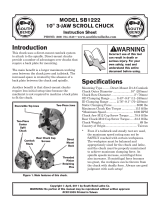 South bend SB1222 Owner's manual
South bend SB1222 Owner's manual
-
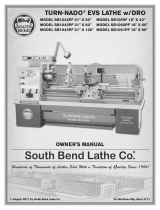 South bend SB1042PF User manual
South bend SB1042PF User manual
-
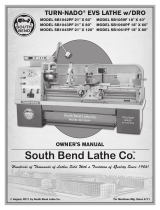 South bend SB1059F User manual
South bend SB1059F User manual
-
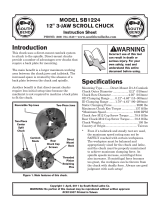 South bend SB1224 User manual
South bend SB1224 User manual
-
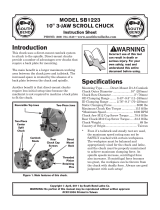 South bend SB1223 Owner's manual
South bend SB1223 Owner's manual
-
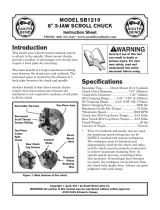 South bend SB1219 Owner's manual
South bend SB1219 Owner's manual
-
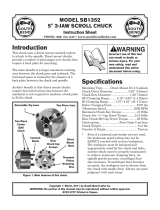 South bend SB1352 Owner's manual
South bend SB1352 Owner's manual
-
South bend SB1015 User manual
-
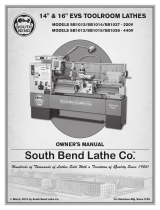 South bend SB1037 Owner's manual
South bend SB1037 Owner's manual
Other documents
-
Harbor Freight Tools Item 93212 Owner's manual
-
Wen 3455 User guide
-
Wen 3455 User manual
-
King Canada KC-1640GH User manual
-
King Canada KC-1640ML User manual
-
King Canada KC-1640ML User manual
-
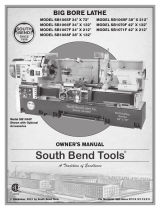 South bend SB1065F Owner's manual
South bend SB1065F Owner's manual
-
Southbend SB1012 User manual
-
Southbend SB1310 User manual
-
Southbend SB1015 User manual
























































































































































